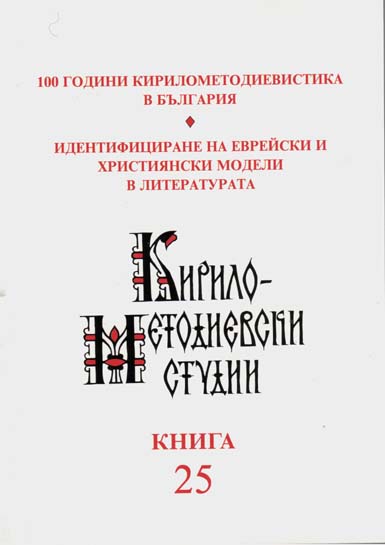Кирилометодиевистиката в БАН – 100 години между науката и политиката
Cyrillo-Methodian Studies in the Bulgarian Academy of Sciences – A Century on the Edge Between Politics and Research
Author(s): Slavia Barlieva, Desislava NaydenovaSubject(s): Special Historiographies:
Published by: Кирило-Методиевски научен център при Българска академия на науките
Keywords: Cyrillo-Methodian Studies
Summary/Abstract: The Article illustrates the process of embedding Cyrillo-Methodian studies within the Bulgarian Academy of Sciences from 1914 onwards. Then it was founded the Kliment committee called to organise the celebration of the thousand anniversary of the Assumption of St. Kliment of Ohrid. Its activities, inspired by patriotic motives of creating national identity becomes a productive structure that paves the philological work of Bulgarian medieval studies for a century. There are two different prospects for evaluating the commission’s activity. One should confess, that this learned body was a nice decoration on Bulgarian national goals and strategies. However, it was also a real research structure which has defined the development of Bulgarian palaeoslavstics a century onward. The patres of Bulgarian Slavistics Alexander Teodorov-Balan, Yordan Ivanov, Benjo Conev, Vasil Zlatarski have led down its main tasks: an edition of the main Cyrillo-Methodian sources, including text and modern Bulgarian Translation; a critical edition of St. Kliment‘s works; publishing a book on St. Kliment‘s Life and activity. Some of this tasks are fulfilled only in our times, others are still pending. A direct result of creating the commission was the first Bulgarian research missions abroad: for the purposes of preparing a scientific archive the palaeographer Vladimir Sis visited Mount Athos, Vasil Zlatarski and Yordan Ivanov were sent to Croatia, Rumania, Frushka Gora and Russia. They work comradely supported by their well-known colleagues Sresnevski, Tunicki, Florovsky. Generally speaking, the missions brought good results – more than 1000 copies of manuscripts and manuscript fragments, needed for the envisaged edition, constructing the base of the future Cyrillo-Methodian scientific archive , now in the digital repository of the Cyrillo-Methodian Research Centre (Cyrillo-Methodiana Digital). After the activity of the Kliment‘s Commission was officially completed in 1916, but its members‘ research was not ceased at all. This resulted in creating the next Cyrillo-Methodian institution affiliated at BAS and funded by it – the Commission for editing the Cyrillo-Methodian sources. It was created with a resolution of the Congress of Byzantine Studies in 1934 and successfully worked until 1944 when it was cancelled because of discrepancy with the soviet idea of the leading role of the Russian literacy in the Slavic medieval world. The commission was revitalised in 1971 and in 1980 was established the Cyrillo-Methodian Research Centre at BAS. Although rated as one of the only two humanities units of the Academy with excellent, internationally recognised research performance (2009), the Centre was suspended by the General Assembly of the Academy (on demand of the Humanities representatives). A month later it was recovered by the same authority because of many negative reactions by Bulgarian and foreign Slavistics institutions and by the Bulgarian Parliament.
Journal: Кирило-Методиевски студии
- Issue Year: 2016
- Issue No: 25
- Page Range: 7-27
- Page Count: 21
- Language: Bulgarian
- Content File-PDF

